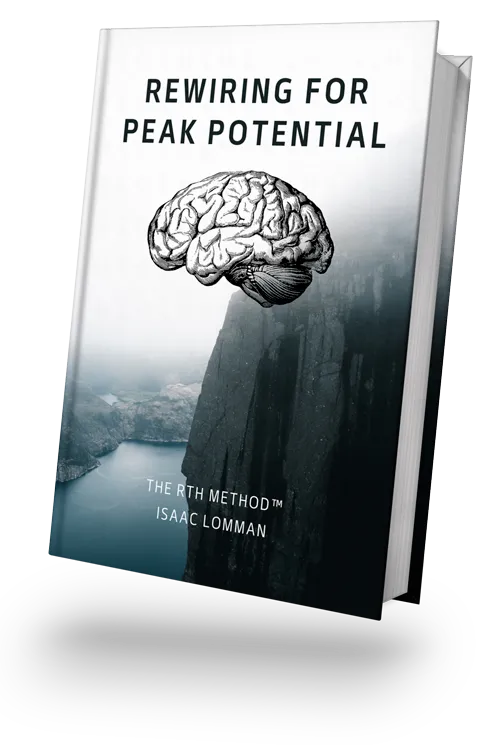PEAK PERFORMANCE
PROGRAM PURPOSE IN YOUR SUBCONSCIOUS MIND
Rapid, Life-Changing Hypnotherapy with the RTH™ Method.
PEAK PERFORMANCE
PROGRAM PURPOSE IN YOUR SUBCONSCIOUS MIND
Rapid, Life-Changing Hypnotherapy with the RTH™ Method.
Discover how rapid Tranceformation hypnosis can help you break free from limiting habits and achieve lasting change, naturally and effectively.
What This Is:
A cutting-edge, results-driven approach to hypnotherapy that combines active subconscious engagement with visible hypnotic phenomena for rapid behavioural change.
What This Does:
Through short, focused sessions, the RTH Method™ helps you break bad habits, reduce anxiety, and transform your mindset by directly engaging your subconscious mind.
What Makes this Unique:
Adelaide Hypnosis is the only practice offering the RTH Method™, which features deep subconscious rapport, fast results, and dynamic, engaging sessions unlike passive or audio-based hypnotherapy

Break free from bad habits, anxiety, and limiting behaviours through engaging, effective hypnosis sessions designed for fast, lasting results.
LEAD MAGNET HEADLINE

LEAD MAGNET HEADLINE

Take Control Of Your Life With Rapid Tranceformation Hypnotherapy
Break free from habits, anxiety, and fears that are keeping you from living your best life.
Feeling trapped by smoking, stress, or a crippling fear of public speaking? These challenges can feel overwhelming, affecting every part of your life. But with the RTH Method™, there’s a solution. Our approach taps directly into your subconscious to deliver rapid, effective results—so you can stop the struggle and start living with confidence. Whether it’s quitting smoking, managing anxiety, or facing your fears, our sessions are designed to help you break through and experience meaningful change—quickly.
Experience Lasting Transformation with the RTH Method™

Personalised Hypnotherapy
Each session is tailored to your unique needs, ensuring the most effective path to transformation.

Rapid Results
Achieve noticeable changes in as little as a single session, whether it’s quitting smoking, managing stress, or overcoming fears.

Holistic Change
Our approach doesn’t just address symptoms—it tackles the subconscious roots of your habits and emotions, creating deep, lasting shifts.
What Exactly Is Hypnosis?

A State of Deep Focus
Hypnosis is a natural, relaxed state of heightened focus where your subconscious mind becomes more open to positive change. This is the part of your mind where long-standing habits, beliefs, and emotional patterns reside. By tapping into this state, we can quickly reprogram the behaviors and thoughts that no longer serve you, making lasting change not only possible but surprisingly easy.
Relaxing & Empowering
Hypnosis is not only deeply relaxing, but it also empowers you to access the subconscious drivers behind your habits and emotions. Through Rapid Tranceformation Hypnotherapy, you’ll discover how effortlessly your mind can release unwanted behaviors—whether it's quitting smoking, reducing anxiety, or improving performance. It’s an effective, fast, and comfortable way to create meaningful change.


Natural & Safe
Hypnosis is a completely natural and safe process. Despite outdated misconceptions, it’s simply a state of focused relaxation where you remain fully in control. With Rapid Tranceformation Hypnotherapy, you’re always an active participant in your transformation journey, and the process is designed to be gentle, supportive, and results-driven.
Proven and Effective
Hypnosis has been shown to deliver profound therapeutic and personal benefits. Today, it’s used by professionals across many fields, including healthcare, sports, and education, for its effectiveness in creating lasting change. Rapid Tranceformation Hypnotherapy builds on this proven foundation, offering a powerful method to help you achieve your goals quickly and with long-term results.

OUR WIDER IMPACT...
15
YEARS EXPERIENCE
1000+
CLIENT HOURS
18
5 STAR REVIEWS
OUR WIDER IMPACT...
15
YEARS EXPERIENCE
1000+
CLIENT HOURS
18
5 STAR REVIEWS
Our Session Plans
We provide specialty programs for Specific Client outcomes
Quit Smoking

A personalised 50-minute session using the RTH Method™ to eliminate smoking or vaping triggers and habits, providing lasting freedom from nicotine addiction.
Weight Loss

A 6-session plan utilising the Hypnotic Gastric Band technique to promote sustainable weight loss by reprogramming eating habits and behaviours at the subconscious level.
Anxiety Release

A 6-session hypnotherapy program designed to relieve anxiety, regain emotional control, and restore peace of mind through deep subconscious work.
Why Traditional Solutions Fail to Deliver Lasting Change
—and What You Can Do Instead
You know how it goes—you’ve tried everything. Maybe it’s patches to quit smoking, endless diets that just don’t stick, or relaxation techniques that barely scratch the surface of your anxiety. And it’s frustrating, right? You feel like you’re doing all the right things, but somehow, you’re still stuck in the same patterns. The truth is, most of these methods only deal with the surface. They’re great for temporary relief but never really get to the root of the problem.
Here’s Why You’re Still Struggling
The thing is, most of what drives your habits, fears, and behaviors is happening under the radar—in your subconscious mind. That’s why no matter how hard you try with willpower or self-help, the change doesn’t stick. Your conscious mind might be on board, but your subconscious is still pulling the strings.
Let’s take smoking as an example. You can throw away your cigarettes, avoid smokers, and chew all the gum in the world, but if your subconscious still links smoking to stress relief, you’ll eventually reach for that cigarette again. It’s not that you lack willpower—it’s just that you’re fighting a battle on the wrong front.
Why Willpower Alone Isn’t Enough
Have you ever felt like, “This time, I’ve got it!”—only to find yourself falling back into old habits weeks or even days later? It’s exhausting. That’s because willpower is finite; it’s like a muscle that gets tired the more you use it. And while it might get you through a short-term challenge, it can’t change those deep, automatic responses wired into your subconscious. That’s where Rapid Tranceformation Hypnotherapy comes in.
So, What Makes Rapid Tranceformation Hypnotherapy Different?
Unlike traditional methods, Rapid Tranceformation Hypnotherapy goes straight to the source—your subconscious mind. And here’s the cool part: instead of just giving you temporary relief or short-lived results, it rewires the deeper patterns that drive your habits and emotions. So, you’re not just dealing with the symptoms (like cravings or stress); you’re changing the underlying programming that causes them.
Here’s how it works:
Direct Subconscious Reprogramming: This approach taps directly into the subconscious mind, where all your automatic behaviours live. We can dig deep to figure out why you’re stuck in these patterns—whether it’s smoking, overeating, or feeling anxious. Then, we rewire those patterns so you can start living the way you want to, without the old baggage.
Engaging Hypnosis: It’s not just about lying down and listening passively. Rapid Tranceformation Hypnotherapy is interactive, showing you how your subconscious works with visible, almost “aha!” moments. You’ll see the connection between your conscious thoughts and what’s really going on beneath the surface.
Fast Results: Unlike drawn-out therapy sessions that can last months or even years, Rapid Tranceformation Hypnotherapy is designed for quick results. In just a few sessions, you’ll experience real, noticeable change. And the best part? Those changes last.
Let’s Talk About Real Results
This isn’t just theory. We’ve seen clients transform their lives—people who’ve tried everything else and thought they were out of options. Here’s how Rapid Tranceformation Hypnotherapy helps in different areas:
For Smokers:
It’s not just about suppressing cravings. With Rapid Tranceformation Hypnotherapy, we identify and rewire the subconscious triggers that keep you reaching for a cigarette. Instead of fighting the urge, you’ll find that it simply fades away. Quitting becomes not just possible—but natural.
For Anxiety:
Anxiety can feel like it’s running your life—whether it’s keeping you up at night, stopping you from enjoying social situations, or making you avoid things that used to be easy. Rapid Tranceformation Hypnotherapy gets to the root of your anxiety by addressing the subconscious patterns that cause it. Imagine feeling calm, centred, and in control—without the constant fight against stress.
For Weight Loss:
Ever feel like no matter what diet or workout you try, something always pulls you back to old eating habits? With the Hypnotic Gastric Band technique, Rapid Tranceformation Hypnotherapy helps you change your relationship with food on a deep, subconscious level. Instead of battling with willpower, you’ll find your cravings shift naturally, and you’ll start making healthier choices without the inner struggle.
Why Adelaide Hypnosis Is Different
We don’t do cookie-cutter sessions or one-size-fits-all approaches. Adelaide Hypnosis is the only place that offers Rapid Tranceformation Hypnotherapy, designed to bring you results quickly and effectively. Whether it’s quitting smoking, reducing anxiety, or achieving weight loss, we tailor each session to meet your unique needs. And unlike passive forms of hypnotherapy, this method is dynamic and engaging, making the transformation feel real and immediate.
What Can You Expect?
Noticeable Changes, Fast: Most clients experience real shifts after their very first session.
Sustainable Results: We’re not about quick fixes that fade. The changes you’ll make with us are deep and designed to last.
Tailored to You: Every session is personalised, meaning you’re not following a script—you’re on a journey to real, lasting transformation.
Ready to Finally Break Free?
Whether you want to stop smoking, find relief from anxiety, or lose weight without the constant battle, Rapid Tranceformation Hypnotherapy can help you get there faster than you thought possible. You’ve tried other methods—now it’s time to try something that works.
[Main Offer Headline]
[Main Offer Tagline]
Main Offer Name

Main Offer Description
Our Services
We have a range of services for different client outcomes.
Entry Offer

Utilising Hypnosis for therapeutic benefits these sessions focus on one specific issue at a time to make changes at the subconscious level.
These are quick sessions with deep changes occurring very rapidly.
Main Offer

Utilising Hypnosis for therapeutic benefits these sessions focus on one specific issue at a time to make changes at the subconscious level.
These are quick sessions with deep changes occurring very rapidly.
Lead Magnet

Utilising Hypnosis for therapeutic benefits these sessions focus on one specific issue at a time to make changes at the subconscious level.
These are quick sessions with deep changes occurring very rapidly.
About Isaac Lomman.
Founder of Adelaide Hypnosis
15 Years Experience
International Keynote Speaker & Thought Leader
Certified Clinical Hypnotherapist
Striving for deep impact in clients, is highly focussed on a long term vision for success for his hypnosis clients. Knowing how much a small change in thinking can make to outcomes in life, his focus on getting results is paramount.

Our Mission
Dedicated towards helping you reach your potential
Our Mission
Dedicated towards helping you reach your potential

Our Philosophy
To be Hypnotic is to live on The Hypnotic Way with predefined goals. When our habits take us unconsciously, automatically towards these goals we are happy & fulfilled.
When our habits take us away from these goals these are now Entranced habits, they no longer serve who we are today.
Most of life is a set of habits learned at some point or another. Our Unconscious Mind stores and runs these habits, they can be replaced to fit the life chapter you're in right now.

Our Promise
As Members of the International Certification Board of Coaches & Hypnotists, we dedicate our focus to you in every session, to help you see the forest for the trees and overcome the challenges you are facing at this point in your life.

Our Guarantee
We are always humbled when our clients place their trust in us to get the best results for them. Therefore we want to ensure you are satisfied with our service.
We offer a 100% money back refund guarantee on our Initial Sessions so you can come and experience this incredible state of mind, because we know you'll love it!

Our Philosophy
To be Hypnotic is to live on The Hypnotic Way with predefined goals. When our habits take us unconsciously, automatically towards these goals we are happy & fulfilled.
When our habits take us away from these goals these are now Entranced habits, they no longer serve who we are today.
Most of life is a set of habits learned at some point or another. Our Unconscious Mind stores and runs these habits, they can be replaced to fit the life chapter you're in right now.

Our Promise
As Members of the International Certification Board of Coaches & Hypnotists, we dedicate our focus to you in every session, to help you see the forest for the trees and overcome the challenges you are facing at this point in your life.

Our Guarantee
We are always humbled when our clients place their trust in us to get the best results for them. Therefore we want to ensure you are satisfied with our service.
We offer a 100% money back refund guarantee on our Initial Sessions so you can come and experience this incredible state of mind, because we know you'll love it!
Knowledge Base
How Hypnotherapy Can Transform Your Life
Discussing the powerful positive changes hypnotherapy can bring ...more
Hypnotherapy
October 27, 2023•3 min read

Conquer Anxiety with the Quiet Mind Anxiety Release Program
Discussing the benefits of Quiet Mind Anxiety Release through hypnotherapy ...more
Hypnotherapy ,Anxiety
October 26, 2023•3 min read

Quit Smoking Once and For All with Hypnotherapy
Discussing the efficacy of smoking cessation with hypnotherapy ...more
Hypnotherapy
October 26, 2023•4 min read

The Science and Art of Stage Hypnosis: Beyond the Spotlight and Mystique
Discussing stage hypnosis as part of the world of hypnotism ...more
Hypnosis
October 26, 2023•3 min read

Unlocking the Power of Hypnotic Gastric Band for Weight Loss
Deep dive into hypnotic gastric band as a concept for weight loss change ...more
Hypnotherapy
October 26, 2023•2 min read

The Intersection of Hypnotherapy and Positive Psychology: A New Paradigm for Holistic Well-Being
Discussing the crossovers with positive psychology and hypnotherapy for changing ones life ...more
Hypnotherapy
October 26, 2023•4 min read

How Hypnotherapy Can Transform Your Life
Discussing the powerful positive changes hypnotherapy can bring ...more
Hypnotherapy
October 27, 2023•3 min read

Conquer Anxiety with the Quiet Mind Anxiety Release Program
Discussing the benefits of Quiet Mind Anxiety Release through hypnotherapy ...more
Hypnotherapy ,Anxiety
October 26, 2023•3 min read

Frequently Asked Questions
How does Rapid Tranceformation Hypnotherapy work?
Rapid Tranceformation Hypnotherapy directly engages the subconscious mind to quickly address the root causes of habits, fears, and emotions. By rewiring these deep patterns, you can achieve fast, lasting change, whether it's quitting smoking, overcoming anxiety, or losing weight.
How many sessions will I need?
It depends on the issue you're addressing, but most clients experience significant results within just a few sessions. For example, our Quit Smoking Plan is designed to help you stop smoking in a single session, while our weight loss and anxiety plans typically involve six sessions for full transformation.
Is hypnotherapy safe?
Yes, hypnotherapy is a completely safe and natural process. You remain in control throughout the session, and there are no side effects. It’s simply a way to access the subconscious mind and make deep, lasting changes.
Will I lose control or awareness during hypnosis?
No, you are always in control during a hypnotherapy session. Hypnosis is a deep state of focused awareness that engages your imagination. You’ll be fully aware of what’s happening, and you cannot be made to do anything against your will.
What if I’ve tried hypnotherapy before and it didn’t work?
Not all hypnotherapy methods are the same. Rapid Tranceformation Hypnotherapy is an active, engaging approach that’s different from passive or audio-based techniques. We focus on achieving real results in a shorter time by directly working with your subconscious mind to create fast, powerful changes.
What issues can hypnotherapy help with?
Our services can help with a variety of issues, including smoking cessation, weight management, anxiety relief, overcoming phobias, stress management, and enhancing personal performance in areas like sports or public speaking. This is not an exhaustive list of what hypnosis can help with.
How do I get started?
Getting started is simple. First steps are to watch the Get Started Hypnotherapy Presentation Video which details this process so you are fully informed. Then you can book your session directly with our calendar booking system OR if you still have questions you can book a clarity call.
What if I don’t see results?
We’re confident in the effectiveness of Rapid Tranceformation Hypnotherapy, which is why we offer a 30-day money-back guarantee on our Quit Smoking Plan. If you don’t see the results you’re looking for, we’ll refund your investment—no risk to you. For other session types we offer a Service Guarantee, meaning if you feel like we didn't provide a space for you to achieve your goals with us and did not fulfil your professional expectations you can ask for a full Money Back refund within 24 hours after the session.
Get in touch with us
Before you enquire, please have a good look through our site. We do our best to answer all questions upfront.
For new clients, be sure to watch our Getting Started Presentation which goes over the details of our service.
For all other enquiries use the form below and we will get back to you as soon as possible.
0483 951 188
PO BOX 1060, Golden Grove SA 5125
10AM - 3PM M-F
Got a Question?

Follow Us
Follow Us
© Copyright 2025. ADELAIDE HYPNOSIS, All rights reserved.
